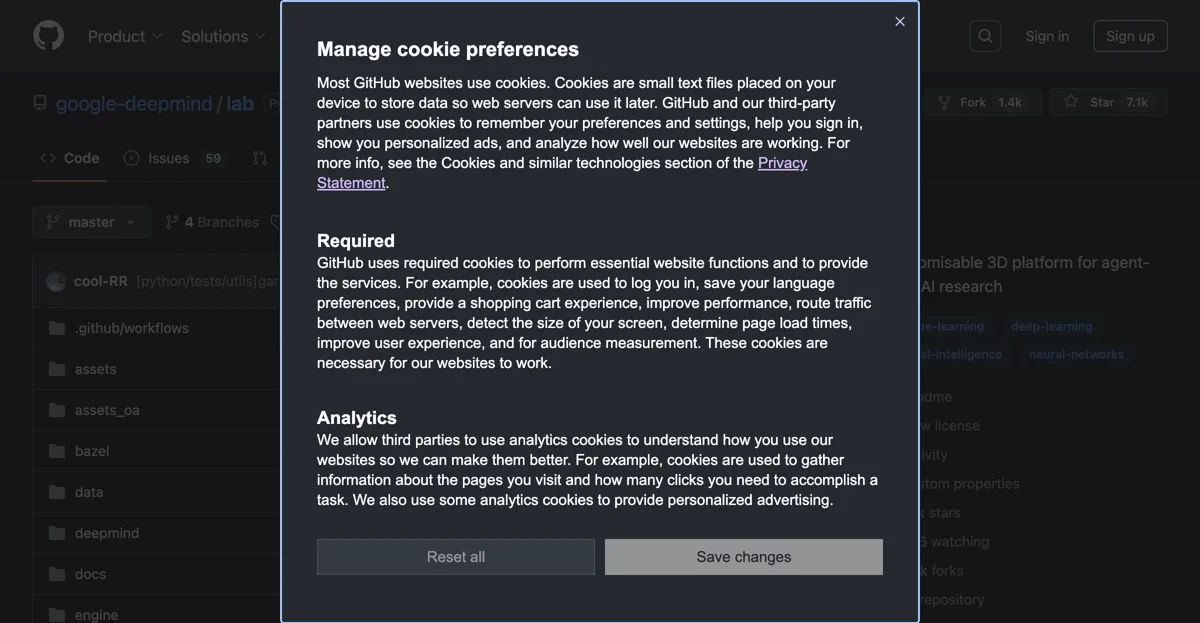DeepMind Lab is a remarkable 3D learning environment based on id Software's Quake III Arena. It offers a diverse suite of challenging 3D navigation and puzzle-solving tasks, making it an ideal testbed for artificial intelligence research, particularly in the field of deep reinforcement learning. The platform provides various features and capabilities that facilitate both human testing and agent training. For instance, users can run a live example of a random agent and print the values of observations at every step. It also ships with an example random agent in Python, which can serve as a starting point for implementing a learning agent. The Python API is used for agent-environment interactions, and bindings to DeepMind's "dm_env" general API for reinforcement learning are provided. Additionally, DeepMind Lab comes with different levels implementing various tasks that can be configured using Lua scripts. The platform is built from the ioquake3 game engine and utilizes tools like q3map2 and bspc for map creation. It depends on several external software libraries, and specific instructions are provided for getting started on Linux. Overall, DeepMind Lab is a valuable resource for researchers in the field of AI.

DeepMind Lab
DeepMind Lab offers a challenging 3D environment for AI research, with tasks and tools for agent training and human testing.

Top Alternatives to DeepMind Lab
DeepMind Lab
DeepMind Lab is an AI-powered 3D learning environment for agents
promptcenter.ai
promptcenter.ai is an AI-powered platform with diverse functions
TensorFlow
TensorFlow is an AI-powered ML platform that simplifies model creation
TypeflowAI
TypeflowAI is an AI-powered tool builder that saves time and boosts efficiency
AItoZee
AItoZee is an all-in-one AI platform with diverse tools
Modal
Modal is a serverless cloud infra for AI, ML, and data apps
Genspark
Genspark is an AI-powered search engine that saves time and delivers better results.
Recogni
Recogni is an AI-powered inference compute system that optimizes performance
Impact AI
Impact AI is an AI-powered platform that enhances AI product delivery
Agentverse
Agentverse is an AI platform for developing and deploying agents
Proseoai
Proseoai is an AI-powered platform offering diverse services
Twinword Ideas
Twinword Ideas is an AI-powered keyword tool that saves time
Lume AI
Lume AI is an AI-powered data mapping tool that boosts efficiency
Archie Labs
Archie Labs is an AI-powered platform that builds apps 10x faster
Tap4 AI
Tap4 AI is a platform with a vast collection of AI tools
PyTorch
PyTorch is an AI-powered framework that enables diverse applications
MLflow
MLflow is an open source MLOps platform for better AI apps
AI Tools Arena
AI Tools Arena offers a diverse range of AI-powered tools
Gretel.ai
Gretel.ai is an AI-powered synthetic data platform that improves models
local.ai
local.ai is an AI-powered tool that simplifies management and inferencing
Secureframe
Secureframe is an AI-powered compliance tool that saves time and reduces risk